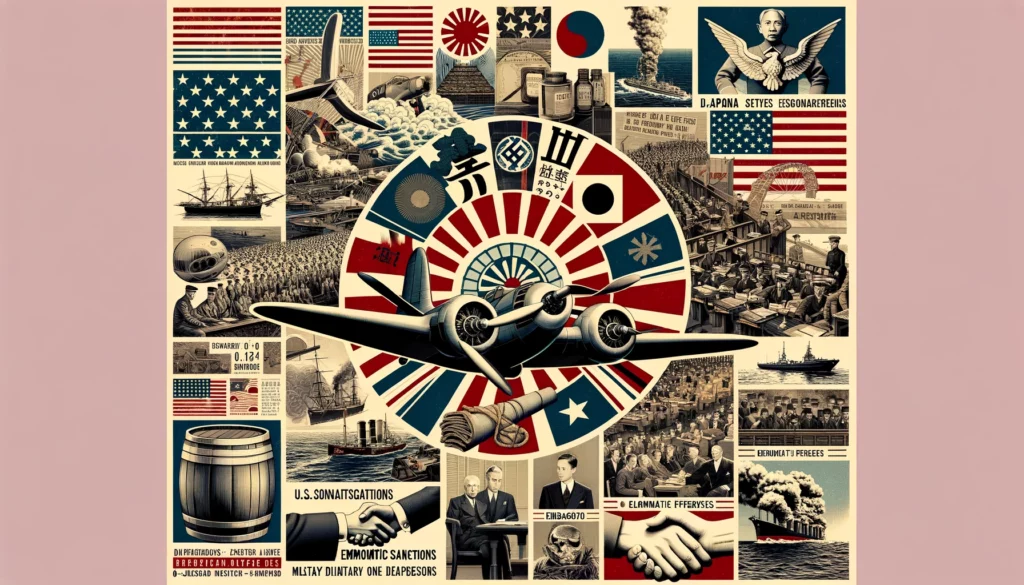Picture a serene Sunday morning in Hawaii, December 7, 1941. Suddenly, the calm shatters as Japanese fighter planes tear through the sky, bombing the U.S. naval base at Pearl Harbor. This assault, unanticipated and devastating, marks one of history’s most pivotal moments. But why did Japan, a nation thousands of miles away, target a peaceful American harbor? The reasons lie not just in that day’s explosions but in a complex web of events stretching back years.
Why Pearl Harbor Matters: More Than a History Lesson
The Pearl Harbor attack did more than ignite a war; it altered the global landscape forever. Understanding its causes helps us grasp the intricacies of international relations and the consequences of diplomatic failures. It reminds us that a single event can ripple across oceans, shaping the future in unforeseen ways. This isn’t just a story of war; it’s a narrative about how world powers collide, leading to consequences that echo through generations.
The Roots of Conflict

The attack on Pearl Harbor, while a singular event in history, was the culmination of a series of interconnected causes and decisions. To fully understand why this unexpected strike occurred, one must delve deeper into the historical context and the motivations behind Japan’s actions.
- Japan’s Resource Needs and Economic Pressures: Japan, as an island nation with limited natural resources, faced significant economic challenges. Its rapid industrialization and military expansion in the early 20th century required vast amounts of resources like oil, rubber, and metals – resources that Japan could not produce domestically. This dependency on foreign resources made Japan extremely vulnerable to external economic pressures and influenced their aggressive territorial expansions in East Asia, seeking to secure these much-needed materials.
- Military Expansion and the Quest for Asian Dominance: The concept of Pan-Asianism, which proposed the idea of Asian nations uniting to resist Western imperialism, was a driving ideology in Japan. This belief, coupled with Japan’s desire to be seen as a dominant power in Asia, led to its expansionist policies. These policies were marked by the invasion of Manchuria in 1931 and later, a full-scale war with China in 1937. Japan’s actions were not merely driven by resource needs but also by a broader ambition to reshape the Asian order with Japan at its helm.
- The Impact of U.S. Embargoes: The United States, disapproving of Japan’s aggressive actions in China and elsewhere, imposed several embargoes on Japan. These included restrictions on oil, steel, and other essential materials. For Japan, these embargoes were not just economic blows; they were perceived as direct threats to the nation’s survival and ability to pursue its imperial objectives. The embargoes forced Japan into a corner, where launching a preemptive strike against the U.S. seemed like a viable option to secure its strategic objectives.
- The Strategy Behind the Surprise Attack: Japan’s decision to attack Pearl Harbor was rooted in a strategic calculation. The Japanese military believed that by delivering a devastating blow to the U.S. Pacific Fleet, they could temporarily paralyze U.S. naval power in the Pacific. This would give Japan a window of opportunity to consolidate its gains in Southeast Asia, particularly in areas rich in natural resources like the Dutch East Indies (modern-day Indonesia).
- Diplomatic Breakdowns and Misinterpretations: In the months leading up to the Pearl Harbor attack, there were diplomatic negotiations between the U.S. and Japan. However, these talks were marred by mutual mistrust and misinterpretations. The U.S. hoped to deter Japanese aggression through sanctions and diplomatic pressure, while Japan saw these actions as further proof of American hostility and obstruction. The failure of diplomacy was, in part, a failure to understand each other’s perspectives and intentions, leading to a catastrophic miscalculation.
Reflecting on the Impact and Lessons from Pearl Harbor

As the echoes of the attack on Pearl Harbor faded, its repercussions resonated far beyond the waters of that Hawaiian bay. This event, occurring over seven decades ago, offers enduring lessons and raises critical questions for contemporary society.
A World Forever Changed
The immediate consequence of Pearl Harbor was the United States’ entry into World War II, a move that altered the dynamics of the conflict. The U.S. involvement on the side of the Allies was a decisive factor in the war’s outcome. Additionally, the attack fundamentally changed America’s foreign policy stance, shifting from isolationism to a more active global role—a stance that continues to influence international relations to this day.
The Human Cost of Conflict
Pearl Harbor serves as a somber reminder of the human cost of war. The loss of life and the suffering endured by soldiers and civilians alike highlight the devastating impact of armed conflict. It underscores the importance of striving for peaceful resolutions and the need for empathy and understanding in international affairs.
The Power and Peril of Perceptions
One of the critical lessons from Pearl Harbor is the danger of misperceptions and miscommunications in diplomacy. The failure of Japan and the United States to accurately interpret each other’s intentions and actions led to catastrophic results. This teaches us the value of open dialogue, clear communication, and the need to consider multiple perspectives in international diplomacy.
Technological Advancement and Warfare
The attack also demonstrated the evolving nature of warfare, particularly the role of technological advancements. The use of aircraft carriers and aerial warfare at Pearl Harbor marked a new era in military strategy. This highlights the continuous evolution of combat tactics and the need for nations to adapt to these changes to maintain peace and security.
Questions for Reflection
As we look back at the attack on Pearl Harbor, we are compelled to ask ourselves: How can we apply the lessons from this event to current global challenges? Can we find ways to resolve conflicts without resorting to violence? How do we balance national interests with the pursuit of international harmony?
The legacy of Pearl Harbor is not just in its historical significance but in its capacity to teach and guide future generations. By reflecting on its causes, consequences, and the lessons it imparts, we honor those affected by this tragic event and take a step toward a more peaceful and understanding world.